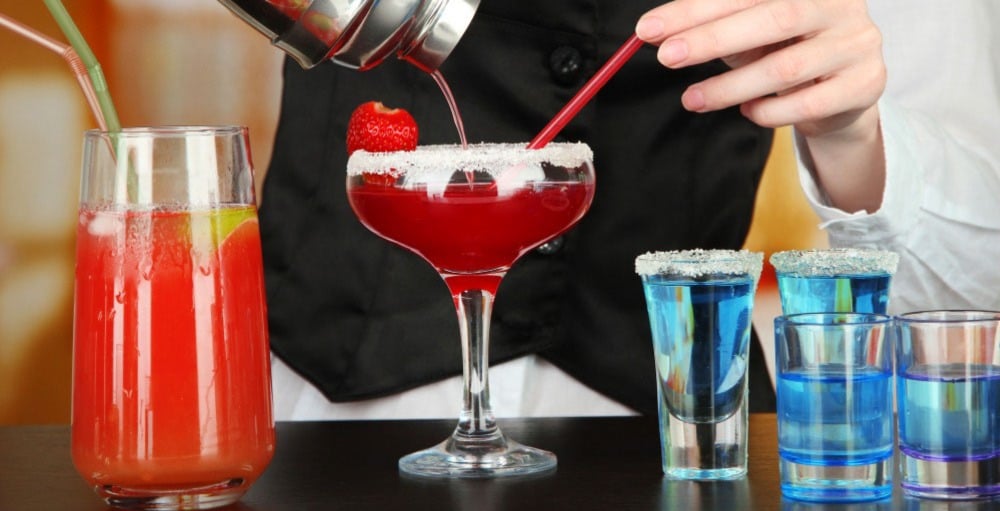If you're thinking of becoming a bartender, bartending school may be one of the first areas you explore.
If you’re looking for a fun and lucrative job that’s in high demand, there are few that rank as highly as becoming a bartender. According to the U.S. Bureau of Labor Statistics, bartender jobs are expected to grow 32 percent from 2020 to 2030, a growth rate much higher than similar occupations. For example, growth of waiter and waitress jobs is projected at 20 percent over the same timespan.
The role of a bartender is diverse in its activities and includes pouring and serving drinks, taking payment and managing money, interacting with customers, managing inventory and physical tasks, like moving boxes of stock from a store room to the bar itself. With such variety, you may be wondering what type of schooling, training or licensing is required to become a bartender.
Requirements can vary by state and the first thought you may have is, “Should I go to bartending school?” There are a number of questions and considerations you can examine to decide whether bartending school is right for you.
What are some of the benefits of bartending school?
There are many benefits to attending bartending school. If you’re just starting out, this is a great place to begin. You’ll acquire the fundamentals of being a bartender in an environment conducive to learning, without the pressure of being on the job at an operational bar. That said, school doesn’t prepare you for the real-world scenario, and some may find that to be challenging. Another benefit of bartending school is that training is delivered by expert professionals.
What do you learn in bartending school?
While the bartending school curriculum may vary by state, programs typically include topics such as:
- Bar setup for both back and front of bars, equipment and maintenance
- Basics of beer and wine
- Bar cleaning and maintenance
- Money handling
- How to mix certain popular or classic cocktails and more on mixology
- Customer engagement and interaction
- Physical pouring and serving techniques
- Types of liquor, their history and their usage
- Industry laws
- Bartending key terms
- Etiquette
The material is fairly standard in all bartending schools, but the style of learning will depend on the format you choose.
In-class vs. online bartending school
The biggest difference between in-classroom and online bartending school is the element of hands-on learning and collaboration. If attending bartending school in-person, all materials will be provided to you and the classroom will most likely have a bar set up. If you’re attending online bartending school, you may be working from home, need to procure materials you don’t have, and be unable to obtain “real world” application of your learnings.
Additionally, in-person bartending school will allow you to directly observe and interact with the professionals teaching you, as well as engage with other like-minded individuals taking the same training. This will allow you to build a network that may come in handy when you’re looking for a job or to enhance your skills down the road. While you will still be able to engage online, some people find it more difficult to create the same quality of connections through a screen.
How much is bartending school?
Cost is an important factor to examine in your assessment. There are many different options out there and the pricing varies depending on the length and format of the program (full-time vs. part-time, in-class vs. online). On average, bartending school cost ranges from $300 to $800 for a 40-hour program.
How long is bartending school?
Like the cost, the duration of bartending school courses can vary depending on the different style or options you choose. Some courses can be completed in as few as 10 hours, while other more advanced courses may be 80 hours in length and take a couple of weeks to complete. It’s best to do your research and find the school that has the offerings best suited to your needs.
What to look for in or ask a potential bartending school
In addition to elements of cost and duration, some other questions you may want to ask any potential bartending school include:
- Will I get a certificate of completion?
- Can I talk to some prior graduates or students?
- What is the employment rate and timing of students who have completed schooling? (i.e. How many graduates went on to get a job and how quickly were they hired?)
- Will I learn about point of sale (POS) systems that bars and restaurants use?
Be sure to check online reviews and feedback of the different schools you’re checking out for additional insights.
Is bartending school required?
For some people, this may be the most important question of all. Bartending school – that is, a formal education credential typically taken after completion of a high school diploma – is not a requirement to become a bartender.
What is required, depending on the state you wish to work in, is obtaining a bartender license or certification. To become a licensed or certified bartender, a different type of training course is required, with the curriculum typically focused on the safe serving and handling of alcohol, responsibilities of alcohol servers, and laws and regulations. Many states require a prospective bartender to obtain a license or certification to legally serve. One example is California, where bartenders are required by law to obtain Responsible Beverage Service (RBS) Training and pass an RBS Exam to serve in the state.
Additionally, it should be noted that many bars look for experience over practical training, so while bartending school can help you learn and be more effective as you start the job, it doesn’t necessarily help your resume. This is very subjective, and will depend on the prospective employer. It’s a good practice to look at different job postings and see how many list “bartending school'' as a preferred or nice-to-have asset.
After asking all of the questions above, you may have one more: is bartending school worth it? The answer ultimately depends on your goals, desire for hands-on or practical experience before you start the job, learning style, financial situation and personal preference.
Regardless of your decision, the one element of bartender training that should not be up for debate is alcohol server training that goes toward whatever license or certification your state requires. Userve’s courses are fast and easy, and you can complete your training 100% online. Visit our courses page to find the alcohol server training course in your state.

